AngloGold Ashanti Malaria Control Programme (AGAMal) officially kick-started the much anticipated 2024 Indoor Residual Spraying (IRS) campaign in all operational districts on Monday, 8th April.
The mission is to provide yearlong protection to approximately 1.3 million lives from deadly malaria and empower futures. Beyond health, the campaign injects vitality into local economies by engaging over 1,300 local community members across sixteen (16) operational districts in the Ashanti (Obuasi Municipal, Obuasi East), Upper West (all districts), and Upper East Region (Builsa North, Builsa South and Kassena Nankana West). The eleven (11) week campaign is expected to end on 21st June.
For this campaign, three (3) World Health Organization Pre-qualified insecticides, namely Vectron T500 (Meta-Diamide), Fludora Fusion, and 2 Gard (Neonicotinoid will be deployed. These insecticides are scientifically selected for their safety, odourless nature, stainless application, and enduring effectiveness in malaria prevention.
The following is the distribution of insecticides among districts;
Fludora Fusion: Lawra, Nandom, Jirapa, Lambussie, Sissala East, Sissala West, Wa East and Wa West.
2Gard: Nadowli Kaleo and Dafiama Bussie Issa
Vectron T500: Obuasi East, Obuasi Municipal, Wa Municipal, Kassena Nankana West, Builsa North and Builsa South.
Central to this campaign is the overarching theme "Small Actions, Big Impact for Malaria Elimination." The IRS Campaigns for the Grant Cycle Seven (GC7) between 2024 and 2026 are set to unfold under this theme. This theme echoes a call to action, urging individuals, organisations, stakeholders and communities to recognise the power of their seemingly modest contributions. Whether it is every room allowed access for IRS, every bed net hung, every drop of stagnant water drained, or every symptom of malaria tested before treatment, each action plays a pivotal role in our collective fight against malaria.
The significance of "Small Actions" lies in their cumulative effect. From sharing knowledge about prevention to ensuring proper waste disposal, even the tiniest gestures create ripples of impact, fostering a community-wide momentum towards malaria elimination.
In this endeavour, every role matters, whether one is a health worker, stakeholder, concerned citizen, or policymaker. Each individual's actionable choices, no matter how small, serve as the bedrock of our shared success.





 Ejisu by-election: I will be shocked if Aduomi is able to secure 5percent vote —...
Ejisu by-election: I will be shocked if Aduomi is able to secure 5percent vote —...
 University President expresses worry over surge in provocative dressings, indisc...
University President expresses worry over surge in provocative dressings, indisc...
 Avetakpo residents lament disregard shown by Ho West officials, threatening to p...
Avetakpo residents lament disregard shown by Ho West officials, threatening to p...
 New Jakpa palace will be grand symbol of our history and culture — Mahama to Yag...
New Jakpa palace will be grand symbol of our history and culture — Mahama to Yag...
 Prof. Jane Naana has shaken Ghana's political foundation, causing NPP to run hel...
Prof. Jane Naana has shaken Ghana's political foundation, causing NPP to run hel...
 I've been receiving threats after I commended NPP for completing school projects...
I've been receiving threats after I commended NPP for completing school projects...
 Bawumia is ready to debate Mahama any day – Frederick Opare-Ansah
Bawumia is ready to debate Mahama any day – Frederick Opare-Ansah
 Register births at CHPS compounds; don't come to Accra – Birth & Death Registrar...
Register births at CHPS compounds; don't come to Accra – Birth & Death Registrar...
 We never said only 10 BVDs were auctioned – EC replies IMANI
We never said only 10 BVDs were auctioned – EC replies IMANI
 Election 2024: Akufo-Addo willing to trample on Ghana’s constitution – Mahama
Election 2024: Akufo-Addo willing to trample on Ghana’s constitution – Mahama
